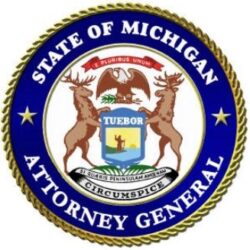
Attorney General Nessel wanted to make sure subscribers saw this release, which was also to be issued through the State Emergency Operations Joint Information Center (JIC). Media Contact: Kelly Rossman-McKinney Courtney Covington FOR IMMEDIATE RELEASE: AG Nessel Urges Federal Government to Stop Discouraging People from Accessing Health Coverage During PandemicGovernment statement “utterly fails” to encourage coverage, testing LANSING — While the coronavirus disease 2019 (COVID-19) public health crisis continues, the Trump administration refuses to confirm that accessing health coverage will not impair lawful immigrants’ abilities to stay in the country, asserts a recent letter from Michigan Attorney General Dana Nessel and 17 other attorneys general. Following a contradictory and confusing alert from the federal government purporting to address the controversy, Attorney General Nessel has again joined a coalition calling on the Trump administration to delay its “public charge” rule while the COVID-19 outbreak spreads across the nation. “Michigan is home to tens of thousands of legal immigrants who have every legal right to receive health care benefits without facing consequences for accepting them,” said Nessel. “COVID-19 doesn’t care who it infects and that’s evident in its impact on our nation and around the world. The federal government should want to do nothing but ensure all who live in this country have access to the care they need to mitigate the spread of COVID-19. I urge our U.S. Department of Homeland Security and the U.S. Citizenship & Immigration Services to do the right thing and suspend this rule at least while we’re in the midst of this crisis.” Federal regulations allow many lawful immigrants to apply for public benefits, such as health care, if they have been in the country for at least five years. The new rule creates a “bait-and-switch” ― if immigrants use the public assistance to which they are legally entitled, they would jeopardize their chances of later renewing their visa or becoming permanent residents. Nessel is also part of a coalition challenging the rule. The coalition won an injunction in federal district court but an appeals court declined to stay the rule while the case is pending. The letter was sent March 19 to Acting Homeland Security Secretary Chad Wolf and U.S. Citizenship & Immigration Services (USCIS) senior official Ken Cuccinelli. It follows a March 6 letter the coalition sent to the same officials calling for the rule’s suspension. Though neither official responded to the initial letter, USCIS posted an “alert” on March 13 that said the government would not consider any form of testing or care related to COVID-19 in immigrants’ public charge assessment, “even if such treatment is provided or paid for by one or more public benefits, as defined in the rule (e.g. federally funded Medicaid).” However, the letter points out that the alert contains confusing and internally contradictory statements about the impact on non-citizens of using Medicaid. In their letter, the attorneys general assert: “If DHS is attempting to ensure noncitizens in our communities remain enrolled in Medicaid so they can use Medicaid services should they have symptoms of COVID-19, the Alert fails to achieve this. And likewise, if DHS is attempting to ensure that noncitizens seek testing and treatment for COVID-19 without fear of public charge consequences, the Alert also utterly fails to achieve this. “Given the grave danger facing our nation’s health and economy, it is imperative that DHS not chill immigrants from enrolling in Medicaid or using Medicaid benefits for any purpose until the COVID-19 crisis is over. “To protect the residents of our states and the rest of the country, we ask that DHS immediately announce that the Rule is stayed pending successful containment of COVID-19. Short of that, however, it is imperative that DHS at least make clear that enrollment in Medicaid and the use of Medicaid benefits for any reason will not be considered in the public charge assessment.” Nessel joins the attorneys general of California, Connecticut, Delaware, the District of Columbia, Hawaii, Iowa, Massachusetts, Minnesota, Nevada, New Mexico, New Jersey, New York, Oregon, Pennsylvania, Vermont, Virginia and Washington in sending this letter. |

